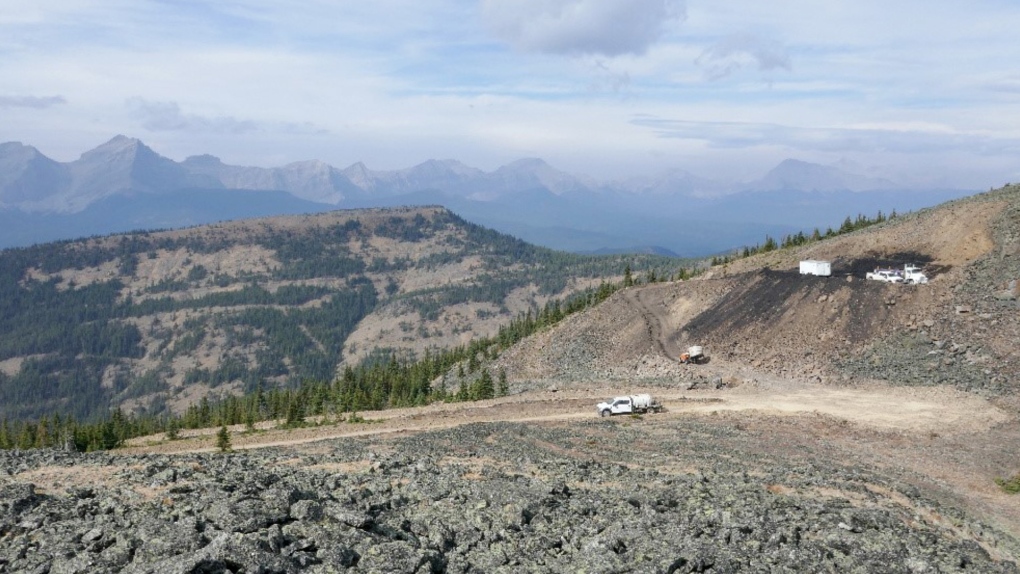Top Alberta court denies appeal of regulator's refusal to approve coal mine
 Coal exploration is shown on Vicary Ridge just south of the Oldman River, taken in fall 2020. (Courtesy Alistair Des Moulins/Alberta Hiking Association)
Coal exploration is shown on Vicary Ridge just south of the Oldman River, taken in fall 2020. (Courtesy Alistair Des Moulins/Alberta Hiking Association)
Alberta's top court has denied a request to appeal a regulatory decision not to approve the Grassy Mountain coal mine in the province's Rocky Mountains.
In a decision released today, the Alberta Court of Appeal turned down the request from Benga Mining and two area First Nations.
Benga had argued the environmental review panel which blocked the mine's approval didn't consider all the expert evidence available to it.
The Stoney Nakoda and Piikani First Nations argued the refusal violated their Constitutional rights by failing to consider the economic benefits they would receive from the development.
But the court disagreed, saying Benga was simply asserting the review panel should have preferred the company's evidence over that presented by opponents.
It adds that the review panel was well aware of what the First Nations had to gain from the Grassy Mountain project.
In its June decision, the review panel said the mine's likely environmental effects on fish and water quality outweigh what it called the low to moderate positive economic impacts of the project.
This report by The Canadian Press was first published Jan 28, 2022.
CTVNews.ca Top Stories

Air traveller complaints to Canadian Transportation Agency hit new high
The Canadian Transportation Agency has hit a record high of more than 71,000 complaints in a backlog. The quasi-judicial regulator and tribunal tasked with settling disputes between customers and the airlines says the backlog is growing because the number of incoming complaints keeps increasing.
Orca calf that was trapped in B.C. lagoon for weeks swims free
An orca whale calf that has been stranded in a B.C. lagoon for weeks after her pregnant mother died swam out on her own early Friday morning.
AFN chief says Air Canada offered a 15% discount after her headdress was mishandled
After the Assembly of First Nations' national chief complained to Air Canada about how staffers treated her and her ceremonial headdress on a flight this week, she says the airline responded by offering a 15 per cent discount on her next flight.
Sophie Gregoire Trudeau on navigating post-political life, co-parenting and freedom
Sophie Gregoire Trudeau says there is 'still so much love' between her and Prime Minister Justin Trudeau, as they navigate their post-separation relationship co-parenting their three children.
DEVELOPING Bird flu outbreaks: WHO weighs in on public health risk
The current overall public health risk posed by the H5N1 bird flu virus is low, the World Health Organization said on Friday, but urged countries to stay alert for cases of animal-to-human transmission.
76ers All-Star centre Joel Embiid says he has Bell's palsy
Philadelphia 76ers All-Star centre Joel Embiid has been diagnosed with Bell’s palsy, a form of facial paralysis he says has affected him since before the play-in tournament.
Island near Mull of Kintyre for sale for US$3.1 million
An idyllic 453-acre private island is up for sale off the west coast of Scotland and it comes with sandy beaches, puffins galore, seven houses, a pub, a helipad and a flock of black-faced sheep.
King Charles' cancer treatment progressing well, says Buckingham Palace
King Charles III’s doctors are 'sufficiently pleased' with his cancer treatment and he is expected to return to public-facing duties, Buckingham Palace announced on Friday.
Flight attendant indicted in attempt to record teen girl in airplane bathroom
An American Airlines flight attendant was indicted Thursday after authorities said he tried to secretly record video of a 14-year-old girl using an airplane bathroom last September.

































